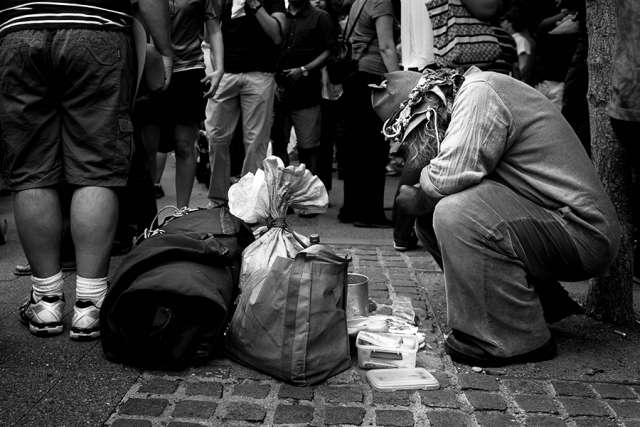For many people, a warm meal is a way to come together, celebrate, and spend time with friends and family. For homeless people living on the streets of Montevideo, Uruguay, it’s an experience that’s rare. But about 500 young people in the city are working to change that.
Every night, especially in wintertime, around 16 groups coming from universities, parishes, and movements in the archdiocese go out to distribute more than 1900 meals to the city’s homeless residents.
The volunteers get together in late afternoon to cook, using donations from parishioners, businesses and the young people themselves. When night comes with its low temperatures, they set out to meet the most needy.
One of these groups is the Luceros Movement, made up of more than 100 volunteers who gather Mondays and Wednesdays at the Virgin of Carmen and Saint Therese Parish to prepare more than 100 meals.
This group came about after a pilgrimage to the Virgin of Salta, eight years ago.
After returning from the pilgrimage, the young participants formed a growing prayer group, and started to “make chocolate milk and some sandwiches to hand out to the people on the street,” Juan José Malvárez told the Catholic Church’s TV channel (ICM) in Montevideo.
“It’s common, if you live in Montevideo, that when you leave your house, on your block or the next, there’s somebody sleeping or living on the street. It’s shocking,” explained Felipe Silva.
“The food is really just a means, it’s a vehicle,” Silva said. “It’s important to fill the belly, but a lot more important to fill the hearts of these people.”
The name “Luceros,” which means “bright stars,” came out of the experience in Salta.
“It’s to be a light in the night, to not hold back the lamp so it can be raised high, to shine down light. It’s to be little lights that illuminate the darkness,” Silva said. The Virgin of Salta speaks about this a little: “you will soon see how you will be transformed into little lights that will illuminate,” he noted.
The spirituality which they have maintained over the years leads the volunteers to pray a Rosary under the title of the Immaculate Mother of the Divine Eucharistic Heart of Jesus before heading out.
Another group, “Mother Teresa of Calcutta’s Kettles,” hails from Mary Queen of Peace Parish. It came about after some of their members decided to continue the works of service they had been performing in preparation for the Sacrament of Confirmation.
Their group goes out on Wednesdays and Saturdays, despite the cold and rain, to carry out this apostolate. Agustin Yurdan told ICM that everyone works together to prepare the food. Some peel and chop the vegetables, while others stir the stew in the kettles.
“We try to be there as much as the people want us to be. Sometimes they need to talk for an hour, and we stay there for an hour. Other times, they grab the warm plate and take off,” he explained.
Gabriel Muscarelli from the Sembradores (Sowers) group, told ICM that their apostolate began 16 years ago as a family initiative. They began with 30 meals and now they distribute around 200, in addition to clothing, personal hygiene products, lightweight material for shelters, and sacramental preparation aids.
“We go out with physical food which is necessary. But it’s much more necessary to bring that hope which is Christ risen in our lives,” Muscarelli said. “And that is what motivates you to face the entire reality of human existence.”

















